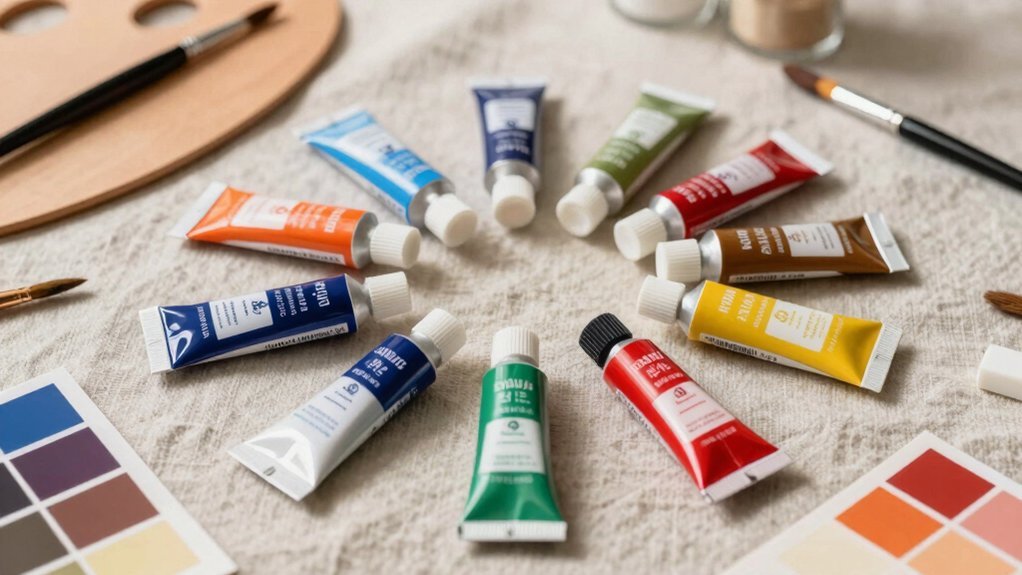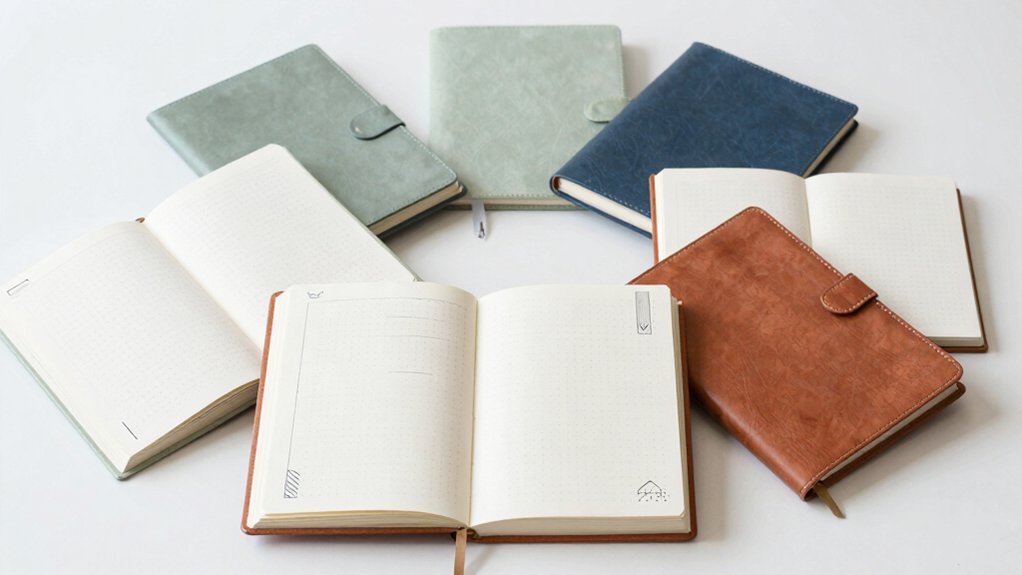Short stories and poetry collections offer bite-sized reads to build your confidence. Graphic novels combine engaging visuals with relatable characters, making reading less intimidating. Audiobooks provide a multisensory experience, enhancing comprehension. Self-help books can equip you with strategies to manage anxiety, while memoirs of successful nervous readers inspire perseverance. Children's books, regardless of your age, can be enjoyable and confidence-boosting. Book clubs create supportive environments for discussion and growth. Remember, there's no one-size-fits-all approach; experiment with different formats to find what resonates with you. The perfect book to boost your confidence is waiting to be discovered.
Short Stories for Quick Wins

For nervous readers, short stories offer an excellent starting point to build confidence. These bite-sized literary works provide quick, satisfying reads that you can finish in one sitting. By completing a story, you'll experience a sense of accomplishment that motivates you to tackle longer works.
Start with collections by authors known for their accessible writing styles, such as Ernest Hemingway or Roald Dahl. Their concise prose and engaging narratives will keep you hooked without overwhelming you. As you progress, explore diverse genres to find what resonates with you.
Short story anthologies are another great option, offering variety and allowing you to sample different authors and styles. Look for collections curated around themes that interest you, such as science fiction, romance, or mystery.
Don't overlook classic short stories, which often pack powerful messages into compact narratives. Works like "The Lottery" by Shirley Jackson or "The Gift of the Magi" by O. Henry can leave a lasting impression and spark thought-provoking discussions.
Graphic Novels With Relatable Characters
Readers seeking a visual storytelling experience will find graphic novels an excellent choice for boosting confidence. These books combine compelling narratives with engaging artwork, making them accessible and enjoyable for nervous readers. You'll discover a wide range of relatable characters facing everyday challenges, allowing you to connect with their journeys and build your reading confidence.
Look for graphic novels featuring protagonists who overcome obstacles similar to those you might face. You'll find stories about friendship, family dynamics, school struggles, and personal growth. As you follow these characters' adventures, you'll develop empathy and gain insights into problem-solving strategies.
Here's a selection of graphic novels with relatable characters to get you started:
| Title | Author | Theme |
|---|---|---|
| "Smile" | Raina Telgemeier | Self-acceptance |
| "New Kid" | Jerry Craft | Fitting in |
| "Guts" | Raina Telgemeier | Anxiety |
These stories offer a perfect blend of text and visuals, making them less intimidating for nervous readers. You'll find yourself immersed in the characters' worlds, building reading stamina and confidence as you turn each page.
Audiobooks for Multisensory Experience

Audiobooks offer a multisensory experience that can engage various learning styles, making reading more accessible and enjoyable.
You'll hear proper pronunciation and fluent narration, which can improve your own reading skills over time.
Engage Multiple Learning Styles
Engaging multiple senses can greatly enhance the reading experience for nervous readers. By incorporating different learning styles, you'll find it easier to connect with the material and build confidence. Choose books that offer a mix of visual, auditory, and kinesthetic elements to cater to various preferences.
Look for books with illustrations, diagrams, or infographics to support visual learners. Audiobooks paired with physical copies allow you to follow along while listening, engaging both sight and hearing. For kinesthetic learners, interactive books with pop-ups, textures, or accompanying activities can make reading more engaging.
Consider exploring books that incorporate multiple learning styles:
| Visual | Auditory | Kinesthetic |
|---|---|---|
| Graphic novels | Audiobook companions | Pop-up books |
| Illustrated guides | Musical elements | Workbooks |
| Photo-rich non-fiction | Rhyming texts | Tactile elements |
Improve Pronunciation and Fluency
Many nervous readers struggle with pronunciation and fluency, which can hinder their confidence. Audiobooks can be a powerful tool to improve these skills while boosting your reading confidence. By listening to professional narrators, you'll hear correct pronunciation and natural pacing, which you can then emulate in your own reading.
Start with audiobooks of familiar stories or books you've already read. This allows you to focus on the narrator's delivery without worrying about comprehension. As you listen, follow along with the physical book or e-book to connect the spoken words with their written form. This multisensory approach reinforces proper pronunciation and helps you internalize natural reading rhythms.
Gradually challenge yourself with more complex audiobooks. Pay attention to how narrators handle dialogue, emphasize certain words, and vary their pace. Try to mimic these techniques when reading aloud.
You can also use the playback speed feature to slow down difficult passages or speed up easier ones, tailoring the experience to your comfort level. With consistent practice, you'll find your pronunciation and fluency improving, leading to greater confidence in your reading abilities.
Reduce Reading Anxiety
Immerse yourself in a multisensory reading experience with audiobooks to reduce your reading anxiety. Audiobooks offer a unique way to engage with literature, combining the power of storytelling with professional narration.
As you listen, you'll hear proper pronunciation, pacing, and intonation, which can help alleviate concerns about reading aloud or understanding complex texts.
Start with popular titles narrated by skilled voice actors or even celebrity readers. This approach allows you to focus on the story without the pressure of decoding unfamiliar words.
You can follow along with a physical copy of the book, creating a dual-sensory experience that reinforces comprehension and builds confidence.
Gradually increase the complexity of the audiobooks you choose, challenging yourself while still enjoying the support of narration.
Try listening at different speeds to find your comfort zone. You'll likely discover that your reading anxiety diminishes as you become more familiar with various writing styles and vocabulary through listening.
Self-Help Books on Overcoming Anxiety
You'll find a wealth of self-help books designed to tackle anxiety and boost your confidence as a reader.
Consider exploring cognitive behavioral therapy guides, which can provide practical strategies to manage anxious thoughts.
You might also benefit from mindfulness and meditation books or positive affirmation workbooks, all of which can help you develop a calmer, more confident approach to reading.
Cognitive Behavioral Therapy Guides
Cognitive Behavioral Therapy (CBT) guides offer practical tools for readers to manage anxiety and build confidence. These books provide step-by-step techniques to identify negative thought patterns and replace them with more positive, realistic ones.
You'll learn to challenge your anxious thoughts and develop coping strategies to face your fears head-on.
When choosing a CBT guide, look for ones that include:
- Worksheets and exercises to practice new skills
- Real-life examples and case studies
- Strategies for long-term maintenance and relapse prevention
Popular CBT guides like "The Cognitive Behavioral Workbook for Anxiety" by William J. Knaus and "Mind Over Mood" by Dennis Greenberger and Christine A. Padesky can help you understand the connection between your thoughts, feelings, and behaviors.
These books teach you to recognize cognitive distortions and reframe them, leading to increased self-confidence and reduced anxiety.
Mindfulness and Meditation Books
Tranquility awaits readers who explore mindfulness and meditation books designed to combat anxiety. These guides offer practical techniques to calm your racing thoughts and ground yourself in the present moment.
Jon Kabat-Zinn's "Wherever You Go, There You Are" provides an all-encompassing introduction to mindfulness, teaching you how to incorporate meditation into your daily life. For a more structured approach, try "The Mindfulness-Based Stress Reduction Workbook" by Bob Stahl and Elisha Goldstein, which offers an eight-week program to reduce anxiety through mindfulness practices.
If you're new to meditation, Pema Chödrön's "How to Meditate" offers clear, accessible instructions for beginners. For a scientific perspective on mindfulness, look to Daniel Goleman and Richard Davidson's "Altered Traits," which explores the long-term benefits of meditation on the brain.
Don't forget about guided meditation books with accompanying audio, like Tara Brach's "Radical Acceptance," which can help you develop self-compassion and ease anxiety.
These mindfulness and meditation books provide valuable tools to help you cultivate inner peace and boost your confidence in managing anxiety.
Positive Affirmation Workbooks
Positive affirmation workbooks offer a powerful tool for rewiring your mind and boosting self-confidence. These interactive guides provide structured exercises and daily practices to help you cultivate a more positive self-image.
By consistently engaging with affirmations, you'll gradually replace negative thought patterns with empowering beliefs about yourself and your abilities.
When selecting a positive affirmation workbook, look for ones that:
- Include customizable affirmations tailored to your specific needs
- Offer journaling prompts to deepen your self-reflection
- Provide practical strategies for incorporating affirmations into your daily routine
As you work through these books, you'll develop a habit of positive self-talk and learn to challenge self-limiting beliefs.
Many workbooks also include visualization exercises, helping you picture yourself succeeding in various scenarios. This mental rehearsal can greatly boost your confidence when facing real-life situations.
Memoirs of Successful Nervous Readers

Throughout history, many successful individuals have overcome their reading anxieties and shared their journeys in compelling memoirs. These stories can inspire and motivate you, showing that reading struggles don't define your potential.
You'll find memoirs by dyslexic entrepreneurs like Richard Branson's "Losing My Virginity," which details how he turned his reading challenges into business strengths.
Actress Octavia Spencer's "Randi Rhodes, Ninja Detective" series draws from her own experiences as a nervous reader, offering relatable characters for young audiences.
Olympic gold medalist Simone Biles' "Courage to Soar" touches on her ADHD and reading difficulties, demonstrating how determination can lead to success.
For a scientific perspective, neuroscientist Maryanne Wolf's "Proust and the Squid" explores her personal journey with reading while examining the brain's reading process.
These memoirs provide valuable insights and coping strategies. They'll show you that many successful people have faced similar challenges, proving that reading anxiety can be overcome.
Children's Books for All Ages
Children's books can be powerful tools for building confidence in readers of all ages. Whether you're a child just starting to read or an adult looking to overcome reading anxiety, these books offer relatable characters, simple language, and engaging stories that can boost your confidence.
When selecting children's books to improve your reading skills, consider these key factors:
- Reading level: Choose books slightly below your current level to build confidence, then gradually increase difficulty.
- Illustrations: Look for books with vivid pictures that support the text, making comprehension easier.
- Topic interest: Select books on subjects you enjoy to maintain motivation and engagement.
Popular children's series like "Magic Tree House" or "Diary of a Wimpy Kid" offer progressive difficulty levels, allowing you to advance at your own pace.
Picture books, such as those by Dr. Seuss, can be excellent for adults learning English or struggling with reading.
Graphic novels, like "Smile" by Raina Telgemeier, combine visual storytelling with text, making them ideal for reluctant readers of any age.
Poetry Collections for Bite-Sized Reading

Poetry collections offer a perfect gateway for nervous readers to build confidence through bite-sized reading experiences. These collections allow you to dip in and out, reading a single poem or a few at a time without feeling overwhelmed.
Look for anthologies that feature a variety of styles and themes, such as "The Poetry Remedy" by William Sieghart or "Poems to Live Your Life By" curated by Chris Riddell.
For those who enjoy humor, consider "I Could Pee on This: And Other Poems by Cats" by Francesco Marciuliano or "Hyperbole and a Half" by Allie Brosh, which combine witty verses with illustrations.
If you're drawn to more introspective works, try "Milk and Honey" by Rupi Kaur or "The Sun and Her Flowers" by the same author.
Don't forget about classic poets who specialize in shorter forms, like Emily Dickinson or Robert Frost. Their concise yet powerful verses can be easily digested in small doses.
Book Club Selections for Support
Joining a book club can be an excellent way for nervous readers to build confidence in a supportive environment. When selecting books for your club, consider titles that are accessible yet thought-provoking, allowing for engaging discussions without overwhelming participants.
Look for books with relatable characters, clear writing styles, and manageable lengths.
Some great book club selections for nervous readers include:
- "The Curious Incident of the Dog in the Night-Time" by Mark Haddon
- "The Guernsey Literary and Potato Peel Pie Society" by Mary Ann Shaffer
- "The House on Mango Street" by Sandra Cisneros
These books offer diverse perspectives and themes while remaining approachable for readers of various skill levels.
They'll spark conversations and help you connect with fellow book club members, boosting your confidence in sharing opinions and insights.
Frequently Asked Questions
How Can I Track My Reading Progress to Boost Confidence?
You can track your reading progress by using apps like Goodreads or keeping a physical reading journal. Set achievable goals, note completed books, and celebrate milestones. This visual representation of your accomplishments will boost your confidence over time.
Are There Online Communities for Nervous Readers to Share Experiences?
You'll find many supportive online communities for nervous readers. Try Goodreads groups, Reddit's r/books, or Facebook reading clubs. These platforms let you share experiences, get recommendations, and connect with others who understand your challenges. Don't hesitate to join in!
What Role Do E-Readers Play in Helping Nervous Readers?
E-readers can boost your confidence as a nervous reader. They'll let you adjust text size, font, and brightness for comfort. You can also look up unfamiliar words instantly and read privately without others seeing book covers.
How Can Teachers Support Nervous Readers in the Classroom?
You can support nervous readers by creating a safe, judgment-free environment. Offer diverse reading materials, allow choice, and provide extra time. Use paired reading, audiobooks, and assistive technology. Celebrate small victories and offer consistent encouragement.
Are There Specific Reading Techniques to Help Manage Reading Anxiety?
You can manage reading anxiety by using techniques like chunking text, reading aloud, practicing mindfulness, and utilizing guided reading. Try breaking material into smaller sections, focusing on one paragraph at a time, and taking deep breaths to stay calm.
In Summary
You've now got a toolkit of books to boost your confidence as a nervous reader. Whether you're diving into short stories, graphic novels, audiobooks, or poetry, remember that every page you turn is a victory. Don't be afraid to explore different genres and formats. Join a book club for support, and celebrate your progress. With time and practice, you'll find your reading groove and discover the joy of losing yourself in a good book.





Leave a Reply